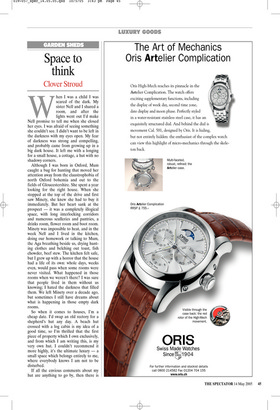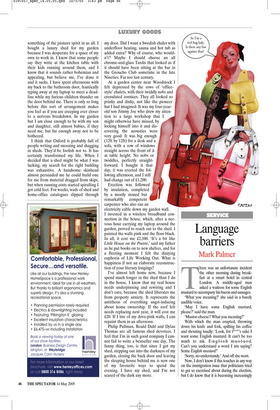Space to think
Clover Stroud
When I was a child I was scared of the dark. My sister Nell and I shared a room, and after the lights went out I’d make Nell promise to tell me when she closed her eyes. I was afraid of seeing something she couldn’t see. I didn’t want to be left in the darkness with my eyes open. My fear of darkness was strong and compelling, and probably came from growing up in a big dark house. It left me with a longing for a small house, a cottage, a hut with no shadowy corners.
Although I was born in Oxford, Mum caught a bug for hunting that moved her attention away from the claustrophobia of north Oxford bohemia and out to the fields of Gloucestershire. She spent a year looking for the right house. When she stopped at the top of the drive and first saw Minety, she knew she had to buy it immediately. But her heart sank at the prospect — it was a completely illogical space, with long interlocking corridors and numerous sculleries and pantries, a drinks room, flower room and boot room. Minety was impossible to heat, and in the week Nell and I lived in the kitchen, doing our homework or talking to Mum, the Aga breathing beside us, drying hunting clothes and belching out toast, fish chowder, beef stew. The kitchen felt safe, but I grew up with a horror that the house had a life of its own: whole days, weeks even, would pass when some rooms were never visited. What happened in those rooms when we weren’t there? I was sure that people lived in them without us knowing; I hated the darkness that filled them. We left Minety over a decade ago, but sometimes I still have dreams about what is happening in those empty dark rooms.
So when it comes to houses, I’m a cheap date. I’d swap an old rectory for a shepherd’s hut any day. A beach hut crossed with a log cabin is my idea of a good time, so I’m thrilled that the first piece of property which I own exclusively, and from which I am writing this, is my very own hut. I couldn’t recommend it more highly, it’s the ultimate luxury — a small space which belongs entirely to me, where everybody knows I am not to be disturbed.
If all the envious comments about my hut are anything to go by, then there is something of the pioneer spirit in us all. I bought a luxury shed for my garden because I was desperate for a space of my own to work in. I know that some people say they write at the kitchen table with their kids running around them, and I know that it sounds rather bohemian and appealing, but believe me, I’ve done it and it sucks. I have spent afternoons with my back to the bathroom door, frantically typing away at my laptop to meet a deadline while my furious children thunder on the door behind me. There is only so long before this sort of arrangement makes you feel as if you are creeping ever closer to a nervous breakdown. In my garden hut I am close enough to be with my son and daughter, still almost babies, if they need me, but far enough away not to be bothered.
I think that Oxford is probably full of people writing and snoozing and shagging in sheds. They’d be foolish not to. It has certainly transformed my life. When I decided that a shed might be what I was lacking, my search for the right building was exhaustive. A handsome skinhead almost persuaded me he could build one for me from material dragged from skips, but when running costs started spiralling I got cold feet. For weeks, wads of shed and home-office catalogues slipped through my door. Did I want a Swedish chalet with underfloor heating, sauna and hot tub as added extra? Why of course, who wouldn’t? Maybe I should choose an all chrome-and-glass Tardis that looked as if it should have been sitting at the bar in the Groucho Club sometime in the late Nineties. Far too last century.
At a garden centre near Woodstock I felt depressed by the rows of ‘officestyle’ chalets, with their twiddly nobs and crenulated cornices. They all looked so prinky and dinky, not like the pioneer hut I had imagined. It was my four-yearold son Jimmy Joe who drew my attention to a large workshop that I might otherwise have missed, by locking himself into it and dis covering the acoustics were very good. It was big enough (12ft by 12ft) for a desk and a sofa, with a row of windows straight across the front of it at table height. No nobs or twiddles, perfectly straight forward. I bought it that day, it was erected the fol lowing afternoon, and I still had change out of £1,200.
Erection was followed by insulation, completed by a mostly stoned but remarkably competent carpenter who also ran an electricity cable down my garden wall.
I invested in a wireless broadband connection in the house, which, after a nervous hour carrying my laptop around the garden, proved to reach out to the shed. I painted the walls pink and the floor black. In all, it cost me £2,100. ‘It’s a bit like Little House on the Prairie,’ said my father as he put books on to new shelves, and for a fleeting moment I felt the dizzying euphoria of Life Working Out. What is happiness if not an elaborate reconstruction of your literary longings?
I’ve almost left home now, because I spend much longer in the shed than I do in the house. I know that my real house needs underpinning and rewiring and I don’t care, because the shed liberates me from property anxiety. It represents the antithesis of everything angst-inducing about home ownership. If the roof felt needs replacing next year, it will cost me £20. If I tire of my dove-pink walls, I can repaint them in an afternoon.
Philip Pullman, Roald Dahl and Dylan Thomas are all famous shed devotees. I feel that I’m in such good company I cannot fail to write a bestseller one day. The funny thing, too, is that since I got my shed, stepping out into the darkness of my garden, closing the back door and leaving the sleeping house behind me is now one of my favourite ways to spend the evening. I have my shed, and I’m not scared of the dark any more.



































































 Previous page
Previous page